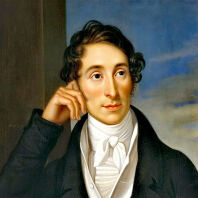Carl Maria von Weber
Composer
Carl Maria von Weber shaped a musical idiom that is inextricably linked with German Romanticism. It was Weber, wrote Hector Berlioz in his famous Treatise on Instrumentation, “who more than any other master has succeeded in making the most original, poetic and complete use of the horn. In his three masterpieces Oberon, Euryanthe and Freischütz, he has given the instrument a new and magnificent voice, which only Méhul and Beethoven seem to have understood before him”.
Carl Maria von Weber was born in Eutin in East Holstein in 1786. He was a piano pupil of Johann Peter Heuschkel in Hildburghausen in Thuringia, and of Michael Haydn in Salzburg, before moving to Munich where his teachers included the court organist Johann Kalcher. Further training took Weber back to Michael Haydn and to Abbé Vogler in Vienna, who offered him the position of Kapellmeister in Breslau in 1804. Two years later, Prince Eugene of Württemberg awarded him the title of music director at the court of the Dukes of Württemberg and Carlsruhe (Upper Silesia), although this was not linked to any employment. Weber later lived in Stuttgart, Mannheim and Darmstadt. During this time, he was primarily recognised as a highly accomplished pianist. As his one-act opera Abu Hassan was accepted for premiere in Munich, Weber travelled to the Bavarian capital, where he became friends with Heinrich Baermann, the first clarinetist of the famous court orchestra of King Maximilian I. Among other things, he wrote the Concertino for Clarinet and Orchestra for him, after the brilliant premiere of which the king immediately commissioned two large-scale clarinet concertos. From 1813 to 1816, Weber was kapellmeister in Prague, where he earned a reputation as one of the leading orchestral conductors of his time, before his appointment to the Dresden court theatre followed. The sensational success of Der Freischütz, which premiered in Berlin on 18 June 1821 at the opening of the new Theater am Gendarmenmarkt, made Weber the leading German opera composer. After the acclaimed Viennese premiere of Euryanthe in October 1823, Weber composed his Oberon for London – for which he had quickly learnt English. The premiere at the Theatre Royal in Covent Garden in April 1826 was enthusiastically received. Exhausted by the exertions of his travels and his numerous commitments in the British capital, Weber died at the home of his London host George Smart on 5 June.